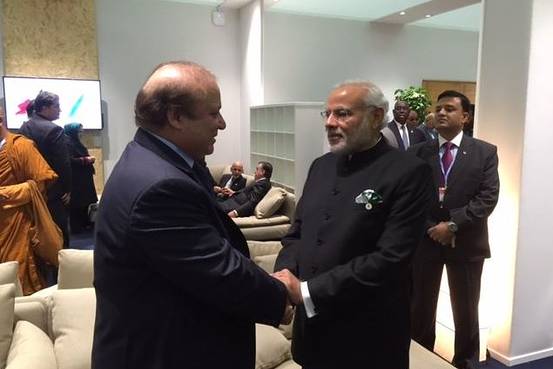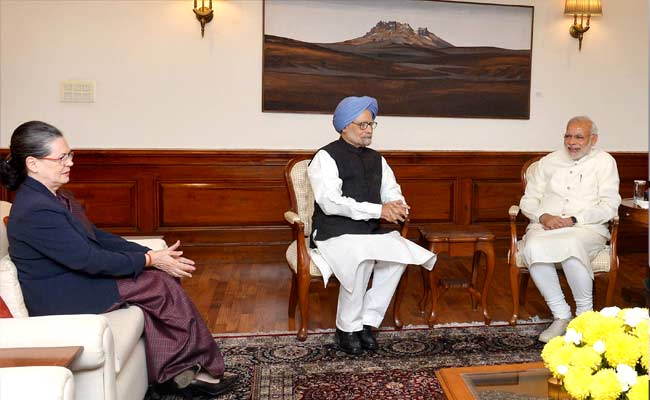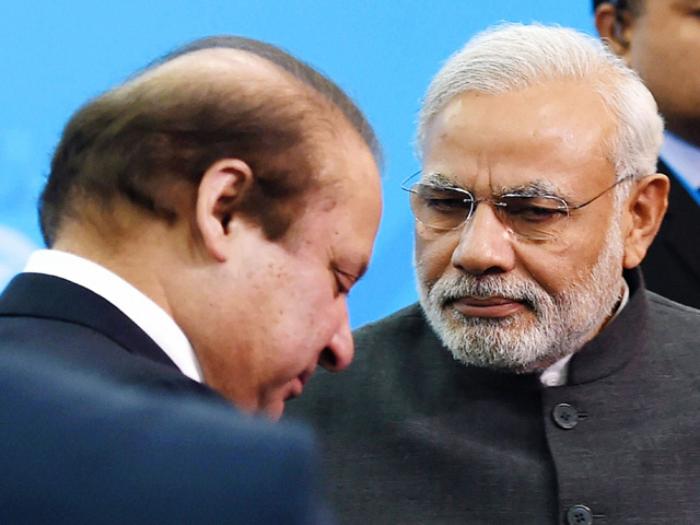
Yes, indeed. Prime Minister Modi is shaping his policies towards Pakistan much along the same lines of former Prime Minister Manmohan Singh, only more aggressively than the UPA leader.
"Modi is good, but Mohan Singh was better," the young guard outside the Presidential Palace in Kabul shared his opinion on Modi's then upcoming visit to Afghanistan in late December 2015. He was, of course, referring to India's former Prime Minister Manmohan Singh, who remains widely popular in the Af-Pak region.
The guard isn't well versed in foreign policy matters or political diplomacy; he is barely educated. But he, and many like him have been keeping a track of Modi's changing relationships towards Pakistan - a dynamic that affects the stability of the entire region. Needless to say, Modi's eventual visit to inaugurate the new Afghan Parliament and then his "surprise" visit to Lahore on Nawaz Sharif's birthday immediately after, reassured the guard that there might not be that much of a change in India's Pakistan policy under Modi.
Modi's renewed enthusiasm towards Pakistan and his pragmatic, yet cautious approach mirrors a lot of what Singh envisioned during his tenure. For one, Modi's recent "surprise visit" was more than just a publicity gimmick, but seemed to be a carefully laid out plan of action for the reconstruction of a stronger bilateral dialogue. Not to mention, extending friendly relations with Pakistan, in its own territory remained Singh's most desired and unfulfilled wish.
And even as the Pathankot terror attacks which followed his visit threaten this ongoing arrangement, it is likely to be met with a mature response, rather than an "all-guns-out" policy.
Evolution of Modi's Pakistan plan:
When Modi came to power in 2014, questions were raised by analysts and political players across parties on the potential change of direction in India's relationship with Pakistan. Sharif's presence at Modi's inauguration gave little comfort to his critics and supporters, alike. Although, his actions against the increased border dispute between the two nations that followed immediately after pleased his more hardline supporters. Modi cancelled key talks with his Pakistani counterpart and did not meet with Sharif even at the UN meeting in September 2014, that both leaders attended.

Then Indian defence minister Arun Jaitely said with much affirmation and applaud, "If Pakistan persists with this adventurism, our forces will make the cost of this adventurism unaffordable." Mentions were made of the nuclear prowess of both nations. However, it was soon evident to Modi and his advisors that this stance towards Pakistan could not be sustainable, albeit popular among Indian nationalists.
The last one year has seen a significant shift in Modi's approach to Pakistan - so much so that it now resembles very closely to the former prime minister's foreign policies.
Singh's Pakistan policy:

File Photo
Interestingly, Manmohan Singh's Pakistan plan was much criticised by the Opposition, including by Modi himself. Remember that time when Modi referred to the UPA defence minister AK Antony as an agent of Pakistan?
But this was, however, as Modi was to soon discover, undeniably a more practical approach.
The 2008 Mumbai terror attacks notwithstanding, Singh had made notable progress in relations with the neighbouring nation. There were strides in an actual peace agreement over Kashmir with the President Pervez Musharraf in 2007 and 2012. The deal fell through when Musharraf was ousted and replaced by Asif Ali Zardari in 2008.
In 2011, Pakistan made a statement suggesting it would declare India as their 'most favoured nation' while their Prime Minster Yusuf Gilani attended a world cup match between India and Pakistan in Punjab. There was a willingness to convert the LoC into an actual border as well. Visa processes between the two nations were also made easier in 2012.
Singh also proposed building 'peace constituencies' across borders by building a gas pipeline to supply LNG to Pakistan.
Singh was right, after all:

PTI
Modi didn't take long to realise how the uncelebrated Indo-Pak courtesies were, in fact, effective steps in building relationships. What followed was a series of phone calls, letters, and meet ups at international conferences between Modi and Sharif.
Modi's initial approach had focussed on tackling the Pakistan's military set-up at the borders. This was very contrary to Singh's approach that had worked towards developing civil, business, and political relations with Pakistan. However, at some point in early 2015, Modi changed his confrontational tactics and started taking an interest in reviving and improving bilateral relations with India's neighbours.
Since then, Modi has taken initiatives to pick up broken conversations with Sharif over the last one year at every opportunity made available, from side meetings at SAARC Summit to Climate talks in Paris to the "surprise" Lahore visit. Some concur that this political affinity may have been responsible for the attacks on the Indian Air Force base in Pathankot as well as increased threat to India's interests in Afghanistan.
He has also shown flexibility over Pakistani leaders meeting with Kashmiri separatists - a stance that has confused BJP party leaders.
His own party members and allies have found it difficult to come to terms with the dynamic tactics towards Pakistan. Defense Minister Manohar Parrikar, earlier today, stated, with reference to the Pathankot attack that those who cause India pain should be paid back. "Basic principle is that until we give them pain, whoever they may be, until then, such incidents will not reduce," he said.
Similarly, Shiv Sena leader Udhav Thackeray has criticised Modi for lack of a "befitting reply" to Pakistan after the attacks. Questions have been raised over the fate of foreign secretary-level talks between the two nations scheduled for 15 January.
Pakistan, on the other hand, is keen to deliver. Already, Sharif has initiated a review of evidence given by India on those involved in the Pathankot attacks. Reports from earlier today stated that Pakistan had made arrests in the case as well.
How the case further unfolds remains to be seen and its implication on India-Pakistan can only be speculated.
Modi might not find much internal support in his attempts to replicate Manmohan Singh's Pakistan policy and it might even cost him his popularity as a nationalist leader. Although, surprisingly, critics and supporters have been kinder to him than they were to Singh; and are more willing to give this kind of diplomacy a chance, some going so far as to laud him for his visit to Lahore.
However, with Modi taking Manmohan Singh's approach further, could open avenues for India to renew relationships between the two nations across several sectors.
First published: 11 January 2016, 10:11 IST







![BJP's Kapil Mishra recreates Shankar Mahadevan’s ‘Breathless’ song to highlight Delhi pollution [WATCH] BJP's Kapil Mishra recreates Shankar Mahadevan’s ‘Breathless’ song to highlight Delhi pollution [WATCH]](https://images.catchnews.com/upload/2022/11/03/kapil-mishra_240884_300x172.png)

![Anupam Kher shares pictures of his toned body on 67th birthday [MUST SEE] Anupam Kher shares pictures of his toned body on 67th birthday [MUST SEE]](https://images.catchnews.com/upload/2022/03/07/Anupam_kher_231145_300x172.jpg)






